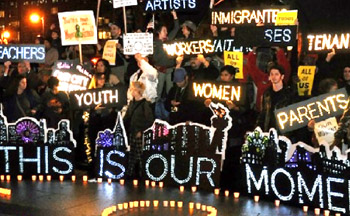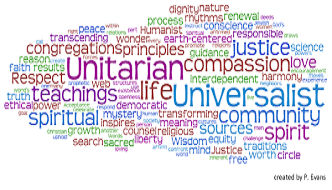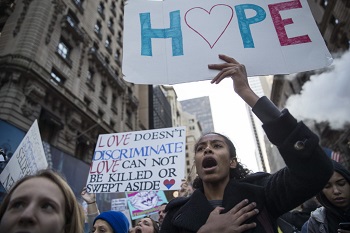Say Yes to Resistance
The election outcome was a shock – but wasn’t something new. Throughout U.S. history we’ve had waves of right-wing populism, when people bought into explanations of their economic hardships that scapegoat other marginalized groups and reject traditional elites. This election was a right-wing populist upsurge that few of us saw coming. We underestimated the number of voters willing to accept racism, sexism, Islamophobia and immigrant-bashing in a candidate.
But we also saw a surge of progressive populism – the kind that criticizes economic systems and the rich – in the strong showing for Bernie Sanders’ campaign and the popularity of Senator Elizabeth Warren. And that can be our source of hope now, that the progressive populists could organize social movements and take over the Democratic Party.
Progressive Populism
The mainstream Democratic Party used to have more progressive populism in its platform, its rhetoric and its political actions, from the 1930s through the ‘70s. But I’m one of many leftists who started criticizing the party in the ‘90s for its turn to the right, for ignoring working class and poor people harmed by de-industrialization and making trade deals like NAFTA and the TPP. In particular, the national Democrats ignored white working class men, the only race/class/gender cluster who actually has lower income today than their fathers and grandfathers.
Democratic leaders didn’t treat falling wages and unemployment as true crises. After the crash they accepted the bailout of “too big to fail” banks and they didn’t push enough for a bailout for foreclosed homeowners. Gradually over the last 30 years the Democratic Party began to get more of its campaign funding from Wall Street, big corporations and wealthy individuals, and began to operate under the delusion that a coalition of well-off coastal liberals and urban people of color could swing national elections – which clearly isn’t always true. They took union support for granted, not realizing that the rank-and-file don’t necessarily vote with the leaders.
“We need to reach out and build personal and political ties with those Trump voters who aren’t committed haters, but whose economic woes and worries we can empathize with. Our first UU principle about the inherent worth and dignity of every person is hardest to put into practice with people we have profound disagreements with.″
Many Democratic leaders also fell into the cultural classism that some of us coastal liberals fall into, of regarding the Midwest as a flyover zone full of gun owners or Christian fundamentalists who are too stupid to have a reasoned political conversation with. It’s important to remember that Donald Trump won the majority of votes from college-educated and high-income whites as well, so we need to be on the alert for classist demonizing of white working class people. This is a white right-wing populist uprising that cuts across classes.
Those of us who didn’t see this coming need to ask ourselves whose voices we hear on a regular basis, why more of the voices of the disaffected rural and Rust Belt white people weren’t on our radio programs, in our newspapers, on our Facebook feeds – and in our personal circles. We didn’t hear them.
We need to stop huddling in our liberal echo chamber talking about how “they” got it wrong and we are right about everything.
Reach Out, Build Ties of Solidarity
“It will take a mass progressive movement to turn our country in a healthier direction.”
Instead we need to reach out and build ties of solidarity, both personally and politically: ties with people already being targeted by street harassment from emboldened bullies who are spray-painting racist slurs and yanking off head scarves; ties with those likely to be politically targeted for deportation and stripped of union rights, health coverage, abortion rights, religious freedom and affirmative action.
But we also need to reach out and build personal and political ties with those Trump voters who aren’t committed haters, but whose economic woes and worries we can empathize with. Our first UU principle about the inherent worth and dignity of every person is hardest to put into practice with people we have profound disagreements with. We may need to put aside disagreements over gun ownership and find common ground in preventing Wall Street and multinational corporations from taking over our democracy and our economy.
 It will take a mass progressive movement to turn our country in a healthier direction. Only a multiracial and cross-class mass movement can limit how much damage the Republican Senate, House and President can do in these coming years. A mass movement could light a fire under the Democratic Party to nominate progressive populists like Bernie Sanders and Senator Elizabeth Warren.
It will take a mass progressive movement to turn our country in a healthier direction. Only a multiracial and cross-class mass movement can limit how much damage the Republican Senate, House and President can do in these coming years. A mass movement could light a fire under the Democratic Party to nominate progressive populists like Bernie Sanders and Senator Elizabeth Warren.
We need a responsive party that is loudly pro-labor, that pushes for full employment policy, that will be firmly anti-sexist and anti-racist, that will tell the truth about how crucial immigrants are to economic growth, and that will treat income inequality as a national crisis. The movement and the party I’m imagining would put forward a progressive populist message that will make sense to economically struggling people of all races and regions.
It’s too early know what effective resistance will be organized to stop the rightward lurch of our country, but when it happens, when you get invitations to join organizations, to boycott, to go to protests and to speak up, please say yes. All of us will need to say yes, say yes, and say yes again.
Betsy Leondar-Wright spoke these words on a panel about race, class and gender in the presidential election, at First Parish UU Church of Arlington, MA on November 13. She is on the board of Class Action (www.classism.org) and on the steering committee of UU Class Conversations (www.uuclassconversations.org ).
Individualism and Universalism
We Are at Our Best in Community
 Unitarian Universalism holds that the individual is the highest authority on their own spiritual health and well-being. No one can tell you what your relationship with the universe should be. We recognize that I cannot fully know and understand what your experiences are or how they have shaped you.
Unitarian Universalism holds that the individual is the highest authority on their own spiritual health and well-being. No one can tell you what your relationship with the universe should be. We recognize that I cannot fully know and understand what your experiences are or how they have shaped you.
But, we must be careful not to fall into the idolatry of the world around us, because the relationship is the thing that we strive for.
Covenantal Faith
Our faith is often called “covenantal.” There is no statement of beliefs that you can recite privately to prove that you are a Unitarian Universalist. You have to make, and keep, a promise to a community.
You have to be a participant in relationships to be fully UU. You have to commit to allowing others to talk to you about your values and ideals and question their place in a responsible life.
You have to accept that you will be encouraged to grow your spirit, even when you are comfortable or growth seems hard. We believe that people are at their best when they are giving their best to the community.
It is easy to fall into the idolization of individuality. We all want to be the hero of our own story, and we want the credit for what we accomplish. But a story is no good without people to listen to it, and no one accomplishes anything in a vacuum. Your community, both in your church and beyond its walls, is at its best when we give everyone the opportunity to be an active participant and give their best back to the community.
Shared Responsibility
To do this, we need to be willing, as a community, to give some support and encouragement to people without them having to earn it on our terms. We need every child to receive a quality education, complete nutrition and adequate shelter. That is how we make them into responsible and compassionate citizens.
We need every person to be guaranteed free time from working to explore the things they love, whether that is painting, music, invention or math. This is how we foster invention and the creation of great art.
We need to address income inequality, as well as the classism behind it, so that those who are struggling can be more fully included in their community, having time and energy to participate. It builds a sense of belonging and shared responsibility.
We need to change how we view the social safety net – not as charity for those who are unable but as support for those who might be able to do more if encouraged and allowed.
We need to put community and a sense of shared responsibility on equal footing with individual achievement and success. Real success should factor in the benefits to the city, the nation and the world. People of every class need to be valued not just for what they have, but how they use it and how much of it they give back.
The United States is in danger of being poisoned by a toxic level of individualism. We’ve lost our civic-minded values, and our infrastructure and education are suffering because of it. We must rekindle the warmth of community if we are ever going to restore the fires of innovation and compassion.
Thomas is the founder and administrator for the I Am UU project. He is passionate about building a better world and a beloved community, and he feels that liberal religion is a vital tool in that construction, and that Unitarian Universalism is the best vehicle for introducing liberal religion to the majority of North America.
Endorsing “A Vision for Black Lives”
UU Class Conversations has endorsed “A Vision for Black Lives,” a carefully crafted policy platform that has been drafted by the Movement for Black Lives. The Movement is a collective of more than 50 organizations representing thousands of Black people from across the country that have come together to articulate a common vision and agenda.
Sharing a Vision
“A Vision for Black Lives” lays out 30+ policy recommendations under six demands. The platform was created in response to the sustained and increasingly visible violence against Black communities in the U.S. and globally.
The Movement for Black Lives Policy Table engaged in a year-long process of convening local and national groups to create the platform. In addition, the coalition solicited feedback from hundreds of people through surveys and national calls as well as from members of coalition organizations.
Shared Policy Priorities
The Movement for Black Live engaged dozens of other organizations, researchers, and individuals for their insights and expertise to begin developing a framework for shared policy priorities. While the platform does not include every policy Black people should be working on, it elevates those for which there was shared energy and action in this political moment.
We encourage you to join UU Class Conversations, and endorse this historic document. And work on the parts of the platform that you and/or your organization most strongly agree with. Read the policies, share them with your community, discuss the points you disagree on, and plan actions around the pieces you support.
Save the Tree, but What About We?

By Bethany Ramirez
If all politics are local, there is currently a dust up about renovations to the park across the street from me. Plans include the removal of a tree that interferes with the community garden area. But the renovations were halted before they began because of a movement to save the tree.
And recently there have been some members of the community (certainly not most) who have made dismissive comments about the community garden in a way that makes me want to unpack some classism.
When Your Justice Collides with Ours
When we first came to look at this apartment, we were quite excited to discover that the community gardens were so close. We were even more excited to learn that there was already a fenced-in garden space in our yard, so we did not need to worry about the waiting list for a community plot. It had not been used for several years, so we invested a lot of time and money into cleaning out concrete and patching the fence.
However, our garden is struggling. Since the garden was last used, one of the trees has grown to cast shade over most of the space. And since the landlord does not want tenants wasting water, there is no water hooked up to the hose – a problem when we are approaching drought conditions.
In order for us to garden next year, either the landlord has to fix both of these problems, or we will have to use the community garden across the street. We rent. We cannot just move the garden location to somewhere else in our yard. Many neighbors don’t have space to garden at all. This is what community gardens are for. In fact, we are sharing our garden with friends from the next town who are on a waiting list for a community garden where it could take them years to get a plot.
There are class issues in the dismissive comments people have made about the community gardens. There are class issues in being able to afford to garden at all in the first place. And there are class issues in claiming a tree is more important than community gardens that have nowhere else to go. We talk a lot about how the poor can’t afford fresh produce, and we’re not letting them grow their own, either.


